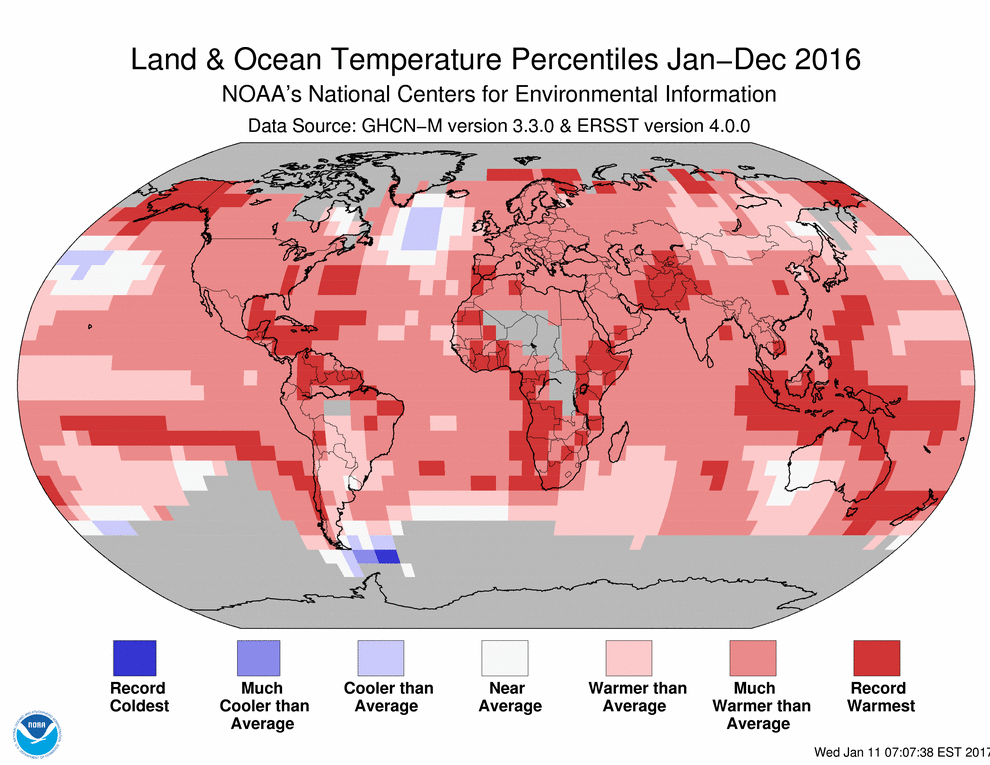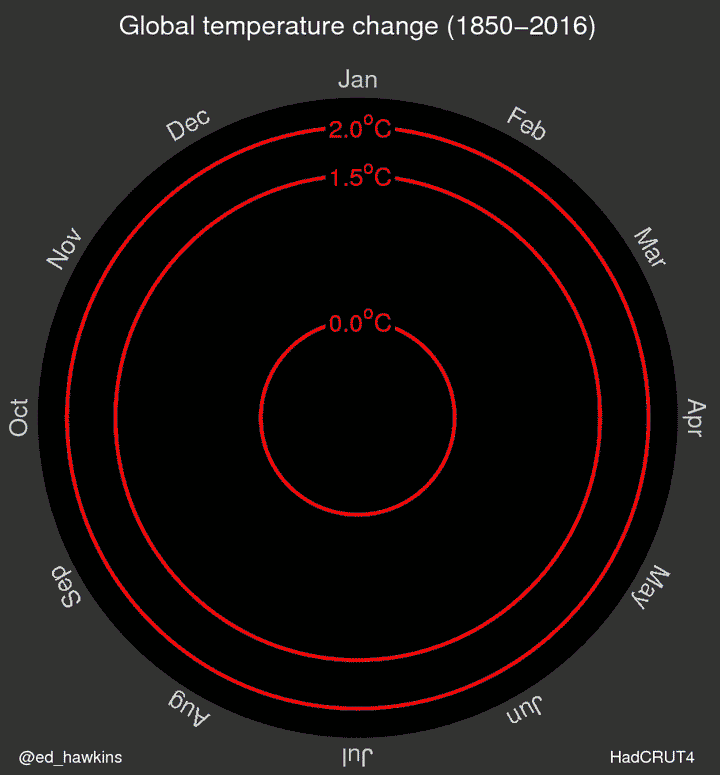A lot is being said about Climate Change. Opinions range from doomsdays to climate hoax. It may be confusing to understand what is Fact, what is Opinion and what is Fiction.
This page focusses on presenting you what science can tell you for a fact on Climate Change and what we do not know for sure.
Fact or Fiction
The planet is already 1°C warmer due to Climate Change
Is it really warmer now?
Since the industrial revolution and the beginning of global measurements (+/-1850) global temperatures have continuously increased.
During the last decades, a significant additional acceleration has taken place, causing the top 16 warmest years ever to be recorded in the last 18 years.
In fact, 2016 was the warmest year ever to be recorded, according to NASA and NOAA (National Oceanic and Atmospheric Administration), surpassing pre-industrial levels by 1°C.
2017 was the third warmest year ever recorded.
Recent studies of historical records, published in one of the world’s leading scientific journals, concluded that the last decade has seen global temperatures which are on average higher than about three quarters of the last 11.300 years.

Sources:
Source - National Oceanic and Atmospheric Administration (NOAA)
Source - National Aeronautics and Space Administration (NASA)
Source - Science Published paper 2013

Source - National Oceanic and Atmospheric Administration

Source - Ed Hawk - Climate Scientist at NCAS
Source - National Oceanic and Atmospheric Administration
The world’s leading international climate scientists all agree that greenhouse gas (GHG) emissions caused by humans are the main driver of current Climate Change.
The Intergovernmental Panel on Climate Change’s (IPCC) Fifth Assessment Report concludes with 95% certainty that human influence on the climate system is clear and is evident from the increasing GHG concentrations in the atmosphere, positive radiative forcing, observed warming, and understanding of the climate system.
At present, there is a strong scientific consensus between Climate scientists on this subject. For more on this, please read the section on Scientific Consensus.

Source - Bloomberg Businessweek
Human activity is responsible for Climate Change
Can Humans Cause Climate Change?
Source - Wikipedia

The fact that humans cause global warming is the position of the Academies of Science, 80 countries plus many scientific organizations that study climate science. More specifically, around 95% of climate researchers actively publishing climate papers endorse the consensus position.
Are you one of the 5% that is not convinced and still doubting what is presented here? We have devoted an entire section to the arguments brought forward by climate sceptics. We hope that our fact checking tips can answer your questions.
Scientific Consensus on Climate Change?
About 95% of Climate Science consensus on Humans Activity causing Climate Change
Sources:
Source - United Nations
Source - Science published Review Paper - 2004
Source - American Geophysical Union published Review Paper - 2009
Source - Proceedings of the National Academy of Sciences Published Review Paper - 2010
Source - Environmental Research Letters Published Review Paper - 2013


More information
Source - Skeptical Science
Source - Skeptical Science
10 Popular Sceptical Arguments
Still sceptical? Or do you know lots of sceptics on the subject?
There is an excellent website that specializes in answering Climate Sceptical Arguments with scientific sourcing. Answers are given with different degrees of complexity, depending on how deep you want to look into the subject.
Below you will find the 10 most Popular Arguments with a link to the answer. (Courtesy of Skeptical Science). For more information, we warmly recommend you to visit Skeptical Science:
1. Climate has Changed Before
2. It's the Sun
3. It's not bad
4. There is no Consensus
5. It's Cooling
6. Models are Unreliable
7. Temperature Records are Unreliable
8. Animals and Plants can Adapt
9. It hasn't warmed since 1998
10. Antartica is gaining Ice

What is Real - What is Fake?
In this era of Fake News and Social Media, it can be difficult to distinguish between what is trustworthy information and what is not.
To help you in identifying which information, articles, videos, etc. you can trust, here are a number of things you can do to sift the Real from the Fake:
1. Consider the Source & Author
Check who is writing/saying it.
-
Is this a trustworthy source?
-
What are its credentials?
-
Is there a reason why they could be having a certain opinion/bias towards the subject?
2. Read Beyond
-
Read what really is being said
-
Check to separate facts from opinion
3. Supporting Sources
-
Can you find other sources that state the same thing?
4. Date?
-
What is the date of the article?
-
Can the information be outdated?
5. Is it a joke?
• There are satirical outlets that write fake stories.
6. Check your biases
-
Is there any reason why you want to think a certain way?
-
Do you benefit in a way if this information would be true/false?
-
Would you be happier if the information was true/false?
Your mind is a tricky thing. Every second you’re hit by millions of bits of information. If you tried to deal with this vast array of input, you’d go mad. In order to preserve your sanity, you filter the incoming information. That is basically a good thing. But often, it can cause you to filter out the information that you don't want to hear and enlarge the information you do want to hear.
7. Ask an Expert
In this information age, it is impossible to be an expert in everything. There is no shame in checking the information with someone who knows more about the subject than you do. Make sure your expert is a trustworthy source and doesn't have a strong bias himself.

Source - IFLA
